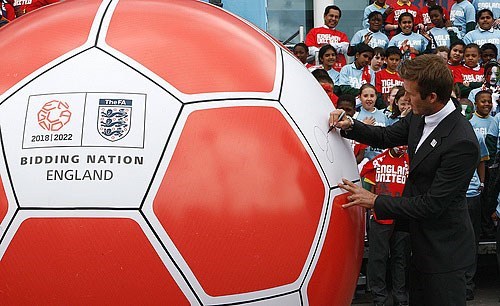Comment
The Biggest Decision in Sport Now Means Nothing

Should the BBC have aired the Panorama documentary before the World Cup decision? Photo (c) flickr user The CBI. Used under a Creative Commons 2.0 licence.
30.11.2010
The situation so far: on December 2, 2010, the world governing body of football – FIFA – will decide which countries get to host the 2018 and 2022 World Cup tournaments.
Actually, FIFA as a whole does not get to decide, rather it is a decision of their 24-man executive committee. This is a big decision, there is nothing bigger in the sports business. It is worth tens of billions of dollars. It has immense symbolic significance. Billions of people watch the games. For example, the World Cup Final of 2006 where France’s Zidane head-butted Italy’s Materazzi was watched by 5% of all humanity who ever lived.
Two months ago, the Sunday Times of London secretly videotaped two of the current executive committee allegedly agreeing to accept bribes for their votes. They also taped four former members talking about the culture of taking bribes by some members of FIFA’s executive committee.
Last week, Dagbladet, a Norwegian newspaper published a story that showed another member of FIFA’s executive committee was trying to sell World Cup tickets to black market ticket touts. On November 29th, the BBC’s Panorama revealed Swiss Court documents that show 3 other executive committee members were taking bribes in exchange for the television rights.
We now have 6 members (or 25%) of the original 24 members of the committee in charge of the world’s biggest sports decision allegedly involved in taking bribes. And at least, four other former committee members speaking openly about the culture of corruption around this decision.
This is a mess. It begs a whole series of questions. Here is my response to them. If you are member of the media please feel free to quote them with attribution.
Should the World Cup decision be called off?
Yes, absolutely. There may be a few Bushmen in the Kalahari Desert who still think FIFA’s process has credibility. However, there are not many other people who have seen the news stories who can regard the up-coming decision with any confidence. The reputation of whichever countries get the World Cup will be besmirched. Better to postpone the decision and come up with a neutral way of awarding the tournament (Nelson Mandela pulling names out of a hat?)
Should the 2018 and 2022 World Cup decisions have been done on the same day?
No. It merely opened the way up for politicking and vote-trading. Better to split them completely. Michel Platini, the head of UEFA, said so too. He is right.
Should the BBC have aired the Panorama documentary before the World Cup decision?
Yes, of course. It is called freedom of speech and no matter how big the sporting event, it should not be trumped. Our ancestors spent over 900-years fighting for the right, we should not throw it away for a game of football.
Should the UK government, led by the Prime Minister David Cameron have expressed frustration at the British journalists who broke this story?
No, see above.
Should the Sunday Times team have used secret video recording?
Yes. If they had not videotaped the conversations, FIFA would never have done anything. The journalists needed to have absolute proof and be able to show it.
Other lessons from this fiasco?
International sport desperately needs an independent, anti-corruption agency. At the moment, there is no one who can investigate these situations without placing themselves in a conflict of interest.
Do these situations lead to match-fixing?
Not directly. But it does contribute to the exploitation of the players. They run on to the fields at the World Cups knowing that someone, somewhere is making a lot of money out of the events and it is not them.
This comment was first published on Declan Hill's Blog on 29 November 2010, and is republished on Play the Game's website with kind permission from the author.





